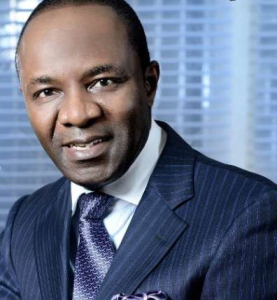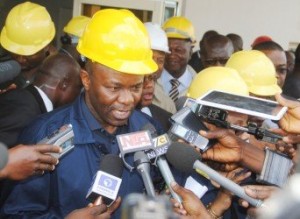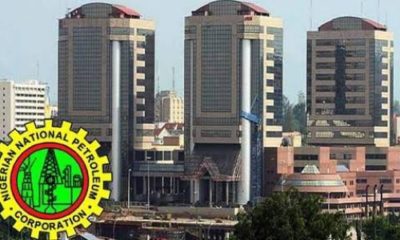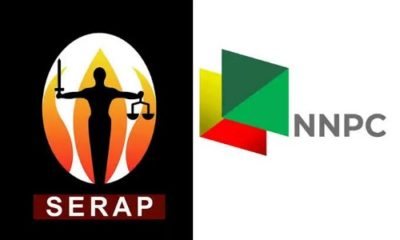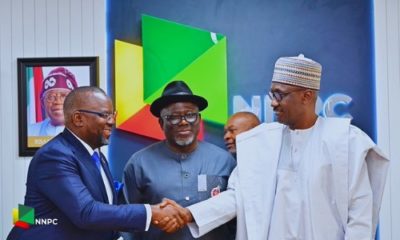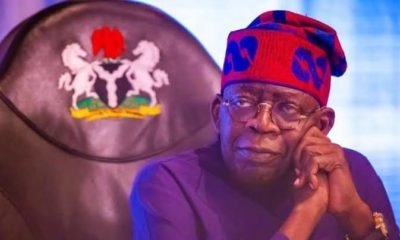Oil
Why NNPC needs a new GMD now

By Yemie ADEOYE
I acknowledge, in the ordinary course of government, that the exposition of the laws and Constitution devolves upon the judicial. But I beg to know upon what principle it can be contended that any one department draws from the Constitution greater powers than another in marking out the limits of the powers of the several departments.-James Madisson (June, 1789).
DALLAS TX-IT is an obvious fact today that some departments of government draw more powers than other departments of same government and all from one constitution, but even at that the fact as established above is that separation of powers is not negotiable, hence the creation of several departments of one government, this is true today even in our personal lives and businesses.
Prior to this era of change, the Nigerian National Petroleum Corporation (NNPC) has been and to a large extent still remains the cash cow of the Nigerian economy as virtually every sector of the economy, and sphere of government was funded either directly or indirectly by this mammoth organization, the largest of its kind south of the sahara.
The emergence of a new national government headed by Mr. Muhammadu Buhari of the former main opposition political party has however seen a more determined commitment towards economic diversification. Hence it has become important to de-emphasise the dependency on the state oil firm while committing resources to other prospective economic drivers. e.g Solid minerals, ICT, Power, agriculture etc.
This would of course come with its expectant effect on the NNPC, as to achieve this Government needs to maximize potentials of the National Oil Company. The NNPC has to become commercially viable and able to compete in the international market especially against other International and Multinational nad national oil companies.
To kick start this drive the President announced in August, the appointment of Emmanuel Ibe Kachikwu, an accomplished lawyer and Vice President Africa for Exxonmobil. Harvard trained, Kachikwu’s appointment was described in many quarters as a master stroke as he is from the igbo extraction, a group which is seen as marginalised by the current government, and he is also seen as a highly cerebral personality who has risen to the pinnacle of his career with the world’s largest publicly traded hydrocarbon company, Exxonmobil.
Not a few people believe that Dr. Kachikwu would be a breath of fresh air from his predecessor who was seen as anything but intelligent and innovative.
In the first few months of his appointment the GMD was focused! He quickly commenced a visit to the strategic business units (SBU’s) of the NNPC. He gave out deadlines to moribund refineries even if the deadlines aren’t feasible, but he went ahead regardless. He gave a new charge to the oil industry, initiating a review of the JV agreements to further maximize national gains, initiating the unbundling of the PPMC in to three strategic companies and making strategic committed moves to end the JV cash call frustrations.
Interestingly, earlier in November, the President apparently impressed by the GMD’s commitment, and achievements in just three months named him as Nigeria’s Minister of state for petroleum resources.
Sadly though, since assuming this post, politics seems to be sucking in this highly cerebral and seemingly dependable individual. He currently holds the post of Petroleum Minister (State) and Group Managing Director of the NNPC, this is seen by experts in the industry as a hindrance to the evolvement of the new NNPC, unbundled and commercially viable.
In Nigeria, it’s no news that a ministerial position is political; the minister is bogged down with political issues. He deals with stakeholders in the oil and gas industry both local and international; he formulates policies for government to drive the sector, serves as the regulator for the entire industry ensuring strict compliance through agencies of his ministry on both the NNPC and other oil companies operating in the country both local and international, he also deals with relevant committees of the national assembly and takes care of issues emerging from that unit of government with specific concerns and demands on the oil and gas sector, worse of all he deals . This is not to mention tons of international engagements as the country is a signature and member to different oil industry organizations and bodies around the world.
For the Minister to handle the above mentioned engagements with the same passion he displayed as GMD, he needs to focus!
While the minister is saddled with all the above engagements, the GMD would concentrate specifically on NNPC businesses, and ensuring that all SBU’s are functioning at almost optimal capacity. The GMD would also ensure that the Minister’s directive is carried effectively carried out. In all he is saddled with the direct operations of the NNPC and not the petroleum industry.
As this piece is being written, Nigerians across the 36 states of the country have been queuing for months to get petrol at the pumps. its been so excruciating for these innocent masses and the Minister amongst other international upstream commitments would still have to deal with this as GMD?
Definitely something has to give way if the minister must stay focused on his engagements. As it stands today, several appointments to either meet with the Minister for investment or other purposes are currently suffering as it is not an easy task to secure an appointment to meet with him.
An American business man who has operated in the oil sector for over three decades told BIZTELLERS on the condition of anonymity that severally he and his team have tried to meet with the “new gentleman” and have sent in a letter for that purpose but have been told severally that he was not in the country and decisions on a feasible date cannot be reached until he gets back. He had to be in Iran, Vienna, and Dubai etc. all on official matters. This was never the case while he held sway as GMD alone.
It has become highly imperative with seeming urgency for the Buhari administration to start shopping for someone with the kachikwu type of cerebral mindedness and avowed commitment to take over the affairs of the NNPC as the GMD.
This will enable the NNPC achieve those goals which the New minister has set before the corporation as soon as he was named GMD. Mr. President, This highly essential job cannot be done alone no matter how well intentioned.
Emmanuel Ibe Kachikwu cannot be a regulator in an industry where he is also a player. If the NNPC and by effect Nigeria must be taken seriously in the global oil and gas industry.
Oil
NNPC Discovers Over 4,800 Illegal Pipeline Connections

The Nigerian National Petroleum Company (NNPC) Limited has revealed the detection of more than 4,800 unauthorized connections on oil pipelines within the country, painting a troubling image of the nation’s primary source of revenue.
Mele Kyari, the Group Chief Executive Officer of NNPC Ltd, communicated this information to the Senate Committee on Appropriations last Friday.
He said, “We have over 4,800 illegal connections on our pipelines. That means in some lines, within 100 kilometres of pipelines, you have as much as 300 insertions.
“Therefore, even when you produce the oil, you cannot deliver them at the required pressure and therefore the volume will also be less.”
As per the NNPC Ltd chief, individuals from various regions enter the Niger Delta, inserting unauthorized connections on pipelines in Nigeria’s oil-producing area.
This recent revelation follows a prior discovery of 295 illegal connections to the pipelines by the firm a year ago, underscoring the escalating issue of crude oil theft in Nigeria.
Two years earlier, Kyari had highlighted the country’s daily loss of 200,000 barrels of oil, amounting to $13 million due to theft and vandalism.
He further stated “We have two sets of losses, one coming from our products and the other coming from crude oil. In terms of crude losses, it is still going on. On the average, we are losing 200,000 barrels of crude every day.”
After the discovery, Nigeria’s security forces pledged to enhance security around the country’s pipelines.
To bolster this, the Federal Government granted a multi-billion naira pipelines surveillance contract to Tantita Security Services, headed by former militant leader Government Ekpemepulo, also known as Tompolo.
Despite facing criticism for this decision, Senator Heineken Lokpobiri, the Minister of State for Petroleum, remains convinced that it was the appropriate course of action.
In August, following a tour of oil facilities in the Niger Delta, Senator Heineken Lokpobiri expressed gratitude to Tantita, commissioned by NNPC Ltd, for their ongoing work.
He also hinted at plans for further extensive endeavors in the future.
In 2021, after extensive debate and delays, the Petroleum Industry Bill was finally passed to attract increased foreign investment into the oil sector through amendments to regulations, royalties, and taxes.
Oil
Dangote Refinery Set To Begin Fuel Production With First Crude Arrival

Nigeria’s colossal $19 billion Dangote Refinery, after encountering several setbacks, is on the verge of kickstarting fuel production.
This achievement is heralded by the arrival of the first crude shipment, transported by the OTIS tanker carrying 950,000 barrels of Nigeria’s Agbami crude.
S&P Global, citing industry sources and tanker tracking data on spglobal.com, reported the tanker’s departure on December 6, en route to Lekki, the nearest land port to Dangote’s offshore crude receiving terminal.
Scheduled to reach its destination around 8 PM on December 7, the arrival of this shipment signifies the commencement of crude supplies for the refinery’s operations.
Chartered by the state-owned Nigerian National Petroleum Company (NNPC), the Suezmax tanker is an emblem of the initial crude supply to Dangote’s cutting-edge refinery, as disclosed by a West African oil trader familiar with the matter in the S&P report.
Even though the refinery was officially completed in May, the absence of domestic crude feedstock had hindered oil product manufacturing.
To address this, the NNPC, holding a 20% stake in the refinery, struck an agreement to provide 6 million barrels of crude oil as feedstock to the Dangote refinery in December.
This move aims to jumpstart operations and overcome the previous impediments.
Agbami, operated by Chevron, holds a prominent position among Nigeria’s major deepwater developments, producing around 100,000 barrels per day in the central Niger Delta.
Known for its light sweet crude qualities, with a specific gravity of 47.9 API and a low sulfur content of 0.04%, Agbami produces substantial amounts of naphtha and kerosene.
NNPC has chartered additional shipments from different Nigerian offshore fields to the refinery, marking the start of a sequence of planned crude supplies for the month, as mentioned by the oil trader.
Located on the outskirts of Lagos, Nigeria’s commercial hub, the Dangote Refinery encountered repeated delays since its 2013 announcement, despite significant installation progress in 2019.
The refinery, designed to handle multiple crudes simultaneously, targets three Nigerian crude grades—Escravos, Bonny Light, and Forcados. When operating at full capacity, it aims to produce 327,000 barrels per day (b/d) of gasoline, 244,000 b/d of gasoil/diesel, 56,000 b/d of jet fuel/kerosene, and 290,000 metric tons per year of propane/LPG.
Dangote’s operations starting signify Nigeria’s hopes to lessen its reliance on gasoline imports, addressing the deficiencies of its existing refineries undergoing repairs. This shift is poised to reshape Nigeria’s oil industry, potentially leading to gasoline self-sufficiency by the 2040s.
Dangote officials anticipate an initial output of 370,000 barrels per day (b/d), emphasizing jet fuel and diesel production.
Industry analysts, however, project the refinery to reach its full operational capacity by mid-2025, although potential delays remain a looming concern.
Oil
NNPCL Sets Dec 2024 Terminal Date For Fuel Importation

The Nigerian National Petroleum Company Limited (NNPCL) has announced intentions to cease importing refined petroleum products by December 2024, anticipating full operational functionality for all national refineries by that time.
Group CEO, NNPC Ltd, Mele Kyari, shared this at a meeting with Speaker Tajudeen Abbas of the House of Representatives, who advocated for the privatisation of Nigeria’s refineries on Thursday.
Projections indicated the national oil firm’s revenue could climb to N4.5 trillion by the conclusion of 2023. Moreover, the rehabilitation of the Port Harcourt Refining Company, managed by NNPCL, was slated for completion by December of the current year.
Meanwhile, Oil marketers verified on Thursday that the Port Harcourt refinery is set for operations, potentially starting in January 2024. They emphasized that once operational, this refinery could notably reduce the prices of refined petroleum products.
During the meeting in Abuja, Kyari asserted Nigeria’s intention to cease importing refined petroleum products by 2024, envisioning the country’s emergence as a net exporter of these commodities within the same year.
He outlined the plans for launching operations at the Port Harcourt, Warri, and Kaduna refineries.
Kyari reiterated that all refineries would operate at full capacity, ultimately paving the way for Nigeria to transition into a net exporter of petroleum products by the conclusion of 2024.
He attributed the inactivity of Nigeria’s refineries over the years to the petroleum subsidy, emphasizing that the removal of this subsidy was drawing significant private-sector investments into the sector.
Kyari said “I can confirm to you that by the end of December this year, we will start the Port Harcourt refinery; early in the first quarter of 2024, we will start the Warri refinery and by the end of 2024, Kaduna refinery will come into operation.
“This is the commitment we are giving today and you can hold us accountable for this. In 2024, many of the initiatives including the rehabilitation of our refineries and also the efforts of small-scale refineries, and the upcoming Dangote refinery, will make Nigeria a net exporter of petroleum products in 2024.
“We will no longer be talking about fuel importation by the end of 2024. I am very optimistic that this will crystallise.
Kyari promised that by the conclusion of 2023, the government’s anticipated revenue from the company would reach N4.5 trillion, emphasizing NNPCL’s adherence to the Petroleum Industry Act and its commitment to delivering value to shareholders.
Recall that in October 2023, it was reported that Nigeria’s monthly spending on the importation of Premium Motor Spirit, known as petrol, had reached approximately N843 billion due to NNPCL’s cessation of oil swaps.
In July of this year, the Nigerian Midstream and Downstream Petroleum Regulatory Authority reported that during the post-deregulation period, spanning June 1 to June 28, 2023, the country’s total petrol consumption amounted to 1.36 billion litres, with an average daily consumption of 48.43 million litres.
The average ex-depot price of petrol, sourced solely from NNPCL as the importer, stands at about N580 per litre.
However, both NNPCL and oil marketers declared on Thursday that this substantial oil import expenditure would soon diminish.
They anticipated a drop once the Port Harcourt refinery commences production of refined petroleum products from January 2024, barring any unforeseen circumstances.

